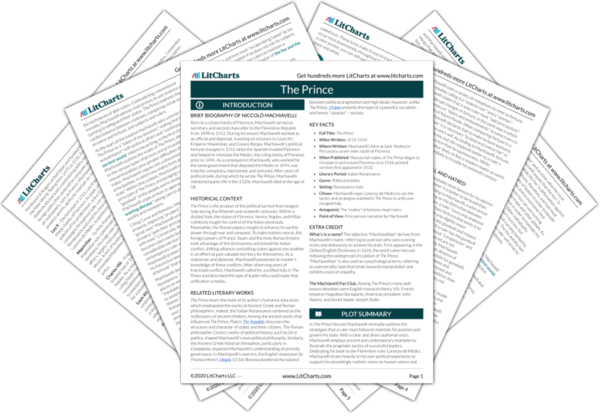Summary
Analysis
Discussing the way in which princes "should honor their word," Machiavelli writes that while it is "praiseworthy" for a ruler "to be straightforward rather than crafty in his dealings," contemporary examples demonstrate that successful princes give "their word lightly." The modern rulers "who have achieved great things" were those who knew how "to trick men with their cunning," triumphing over those who clung to "honest principles."
Machiavelli again emphasizes that princes are held to a moral standard that reverses the typical distinction between virtues and vices. Wise rulers will seek to develop their cunning and intellect, which form a crucial aspect of their prowess. Rulers must not shirk from breaking promises when necessary.
Themes
Machiavelli states that there "are two ways of fighting: by law or by force." Fighting by the law is "natural to men," while fighting by force is natural to animals. Machiavelli argues that rulers must know how to fight like "beasts" because fighting by law "often proves inadequate" on its own. Citing ancient allegories in which princes like Achilles were trained by centaurs (creatures that are "half beast and half man"), Machiavelli explains that princes must learn from the nature of both man and beast in order to survive.
Machiavelli highlights the importance of using laws and arms to secure one's position. However, Machiavelli states that defending one's state by law alone "often proves inadequate," a statement that underscores his primary focus on arms. The description of manlike and beastlike prowess draws on the same union of opposites that defines much of Machiavelli's advice.
Themes
Since a ruler must learn to act like a beast, Machiavelli urges princes to study "the fox and the lion." The lion is "defenseless against traps" but can easily "frighten off wolves." Conversely, the fox is "defenseless against wolves" but can ably "recognize traps." From this metaphor, Machiavelli concludes, "A prudent ruler cannot .... honor his word when it places him at a disadvantage and when the reasons for which he made his promise no longer exist." "This precept" holds because "men are wretched creatures" who frequently break their own promises. Machiavelli writes, "Those who have known best how to imitate the fox have come off best." Thus, an able ruler must be an adept "liar and deceiver." Machiavelli cites the "fresh example" of Alexander VI, who "never did anything, or thought of anything, other than deceiving men." As a master of deception, Alexander always achieved his ends.
In order to possess true prowess, a prince must absorb the lessons of the fox and the lion, combining cunning and force to overcome any number of challenges. By honing the skills of these two different beasts, a prince will provide himself with a well-rounded set of abilities. Like a fox, princes must be crafty and cunning, keeping their word only when it benefits their own interests. To survive and prosper, a ruler must be a skilled "deceiver" or else he will be tricked by the conniving and self-serving figures that surround him. To be a successful ruler is to be a skilled liar and in the service of the state dishonesty becomes a virtue.
Themes
Machiavelli adds, "A prince .... need not necessarily have all the good qualities I mentioned above, but he should certainly appear to have them." However, if a prince actually possesses good qualities and allows them to dictate his conduct, then he will find these attributes "harmful." It is only if he appears to have these traits that "they will render him service." A prince, especially a new prince, cannot always act virtuously, because "in order to maintain his state he is often forced to act in defiance of good faith, of charity, of kindness, [and] of religion." A ruler should possess a "flexible disposition" that varies with the dictates of fortune. If possible, a prince "should not deviate from what is good," but he must know "how to do evil, if that is necessary."
For princes, the distinction between virtues and vices relies on the specific circumstances. A skilled ruler will possess the prowess and "flexible" demeanor necessary to decide whether a situation demands virtue or vice. Machiavelli stresses that a ruler should not agonize over the occasional need to act unvirtuously, since his highest priority must always be the preservation of his position and state. However, a prince must concern himself with preserving the pretense of virtue, which will win him favor.
Themes
Get the entire The Prince LitChart as a printable PDF.

In front of his subjects, a prince must always appear to be "a man of compassion, a man of good faith, a man of integrity, a kind and a religious man." In particular, Machiavelli emphasizes the importance of this last characteristic. Machiavelli argues that the people judge princes by outward displays and are "always impressed by appearances and results." Machiavelli cites a "certain contemporary ruler, whom it is better not to name," who preaches "peace and good faith" and acts in violation of both. This behavior, however, has allowed him to maintain his state and his standing.
Because princes are judged on "appearances," it is necessary to maintain the façade of virtue to appease the people. Ferdinand of Aragon, the unnamed "contemporary ruler," talks of peace, but his violent actions contradict his words. It requires great prowess to maintain the pretense of virtue while acting in the unvirtuous way needed to secure one's state.
Themes












